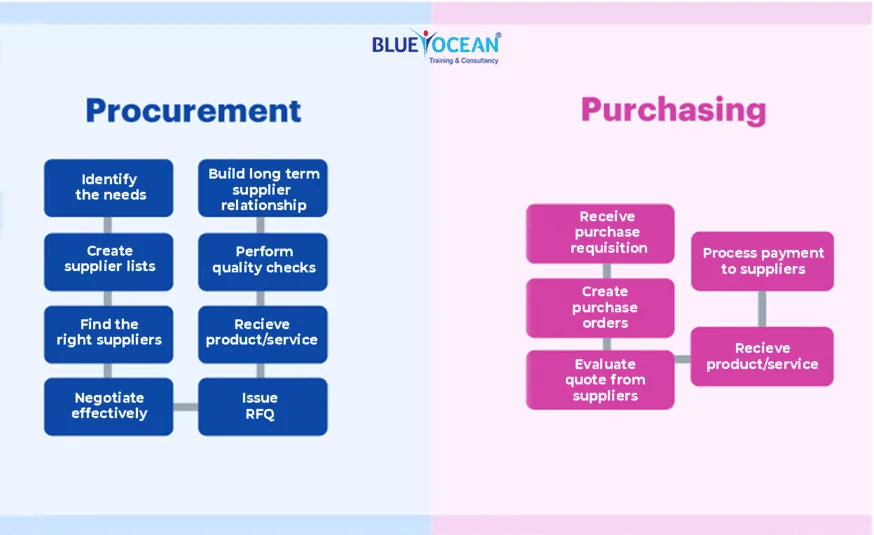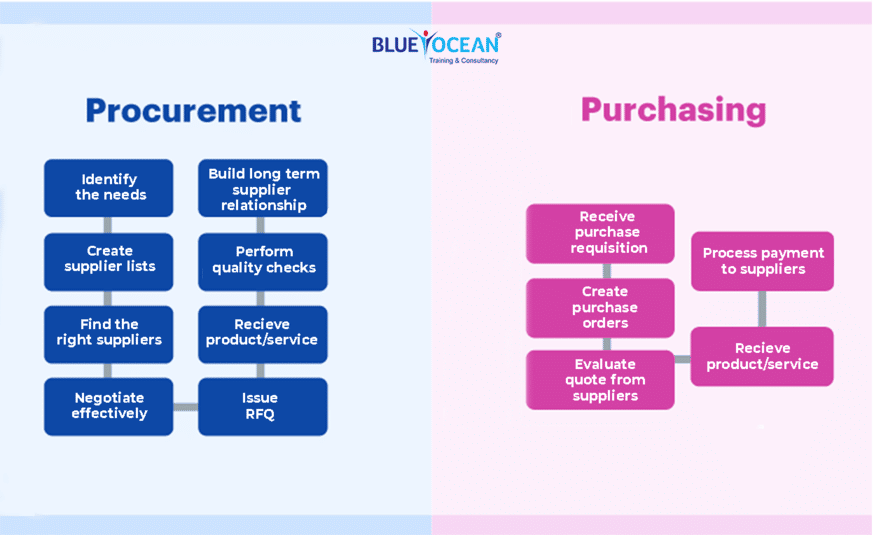
Understanding the difference between procurement and purchasing
Is procurement and purchasing the same concept?
Most people often confuse both these terms and use them interchangeably. However, there is a world of differences between procurement and purchasing which mainly depend on the results that they create in an organization. In simple terms, procurement and purchasing are two different business processes that are related to the sourcing and acquisition of goods as per the organization's needs.
If an organization is not able to distinguish between procurement and purchasing, it may overlook some key components that help to improve the bottom line. In this blog, we will see the major differences between both the terms and evaluate their significance in business.
What is purchasing?
Purchasing is the process of buying goods/services for the organization. It is a particular function that comes under procurement. The common steps in the process include placing the order, selecting the suppliers, receiving goods/services, generating invoices and paying the supplier. It mainly focuses on short-term goals such as fulfilling the five rights in a transaction (right quality, right quantity, right cost, right time, and right place).
What is procurement?
Procurement is the process of sourcing and acquiring goods from a third party to fulfill the needs of an organization. It is a strategic process that involves identifying the needs of the organization, finding the right suppliers, building long-term supplier relationships, managing risks in procurement, negotiating with suppliers and creating contracts. The main focus of procurement is to ensure the profitability of the organization in the long run while focusing on the value and return of investment. While purchasing is concerned only about the acquisition of goods, procurement is an ongoing function that continuously looks after supplier relationships, internal needs, market trends and supply chain costs.

Purchasing vs Procurement: Shifting focus from price to value creation
While purchasing is a specific function that is related to the buying of goods/services, procurement takes a holistic view of the overall process with an emphasis on the strategic goals of the company.
| Purchasing (the reactive process) | Procurement (the proactive process) |
| Focuses on buying goods/services for the company | Identifies the needs of the company and the fulfillment of those needs. |
| Gives more importance to the price of the goods | Gives more importance to the value of the goods than the price |
| Straightforward process of purchasing commodities | Involves the steps that happen before, during, and after purchase |
| Includes ordering, expediting, and payment fulfillment | Includes need recognition, sourcing, and contract closure |
| Transactional–focuses on transactions than vendor relationships | Relational–focuses on creating long-term vendor relationships |
Why procurement is more important than purchasing?
Procurement is a wider term that encompasses some of the core functions in business. It includes the selection of suppliers, maintaining healthy relationships with suppliers, documentation and also aligning the procurement strategy to the corporate strategy. Well, the last function shows how a wrong procurement strategy can make the company pay a huge price. For instance, if a company has adopted a green policy, it should be reflected in the procurement strategy too. The procurement function is more detail-oriented, involves many people and tasks and has strategic importance as it drives the overall performance of the organization. Following are the key factors that must be considered in procurement:- Business ethics
- Logistics
- Quality
- Risk management
- Setting rules for purchasing
- Reducing costs
- Provide training in procurement to help employees think strategically
- Analyze the procurement process to foresee the long-term trends
- Manage positive relationships with the suppliers
- Manage contracts efficiently
Facebook
Twitter
LinkedIn
WhatsApp
Email
How Did Santa Become the World’s Best Supply Chain Professional?
Every December, the world witnesses a logistical miracle.One organisation delivers billions of customised products to millions of destinations in a…
